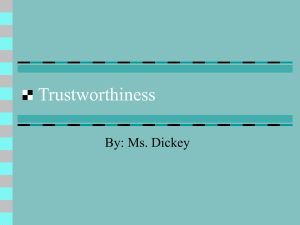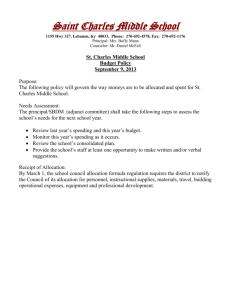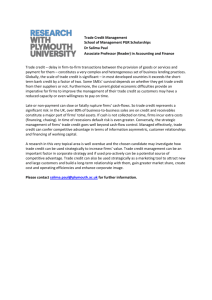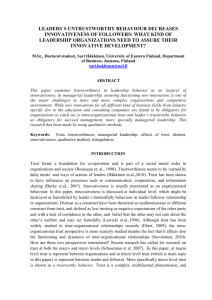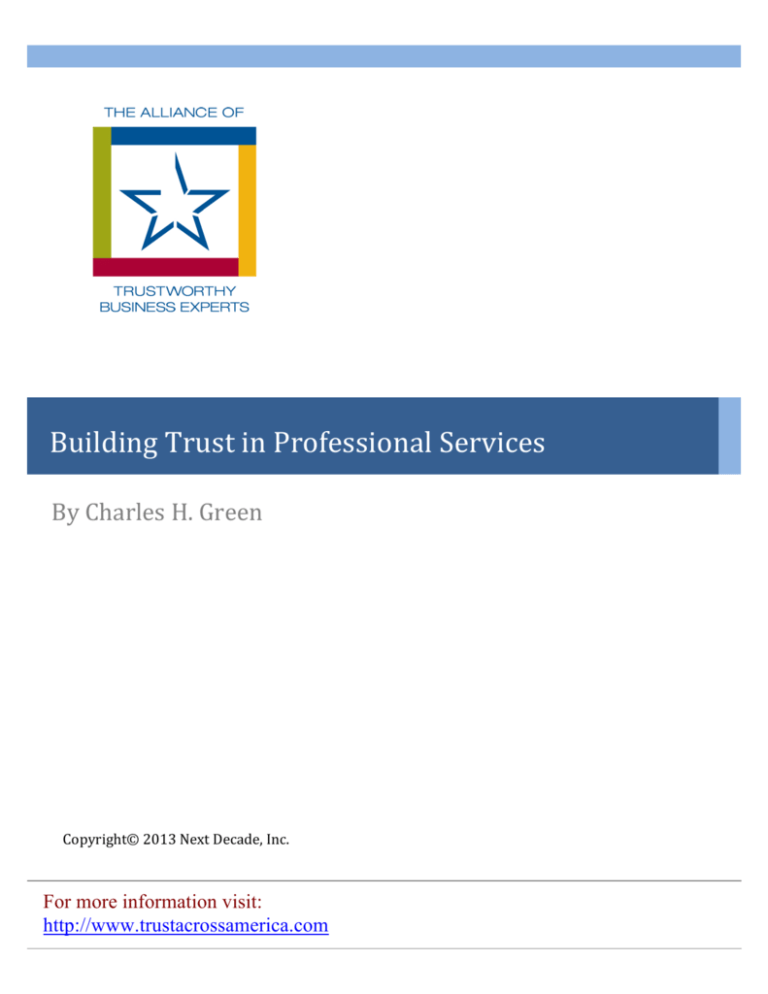
Building Trust in Professional Services By Charles H. Green !
Copyright©!2013!Next!Decade,!Inc.!!
For more information visit:
http://www.trustacrossamerica.com
Building Trust in Professional Services Writer Qualifications My name is Charles H. Green. I am an author, speaker and world expert on trust-­‐based relationships and sales in complex businesses. I am the Founder and CEO of Trusted Advisor Associates, and the co-­‐author of the classic The Trusted Advisor and its practical follow-­‐up, The Trusted Advisor Fieldbook, and author of Trust-­‐based Selling. I work with complex organizations to improve trust in sales, internal trust within organizations, and trusted advisor relationships with external clients and customers. I have spent 20 years in management consulting after majoring in philosophy (Columbia), and Business (Harvard). My articles have appeared in Harvard Business Review, Directorship Magazine, Management Consulting News, CPA Journal, American Lawyer, BusinessWeek, Forbes.com, Investments and Wealth Monitor, and Commercial Lending Review, and I am a contributing editor at RainToday.com. Defining Professional Services The term "professional services" encompasses industries that are largely services-­‐based (not product-­‐based), and staffed mainly by people who must have high levels of subject-­‐matter expertise. People usually have advanced degrees and/or a kind of industry certification, though I don't consider this a necessity. Professional services by this definition include but are not limited to: accounting firms, management consulting firms, law firms, wealth managers, human resource and actuarial firms, architects, real estate brokers, and advertising and PR agencies. What's different about trust in professional services? It is not easy to create an organization that behaves in a trustworthy manner with all its stakeholders. In most industries or functions, it requires a coordinated approach on several fronts – incentives, structure, values statements, talent, processes, enforcement, and policies, to name just a few. In professional services, the good news is that the lion's share of the effort can be focused on one dimension – people. Professional services are personal businesses in a plethora of ways that other businesses are not. If you get the people part of the equation right, you've got the job largely done. © 2013, Charles H. Green, All Rights Reserved
On the other hand, the bad news for professional services is that the one dimension that needs to be focused on is – people. An avoidance of and a discomfort with people issues is the prime reason that a great many service professionals entered their professions to begin with. It may seem odd that a "people business" is usually not very good at people issues, but it's a fact nonetheless. And the road to trust must go directly through it. Five Key Trust Issues in the Professional Services Industries While professional services firms have exposure to the same range of stakeholders as other industries, two of them are particularly critical – clients and employees. Most of the trust issues arise in the context of those two stakeholders. 1. Trusting is as important as trustworthiness. The need for clients to trust their professionals can be extreme in professional services. An accountant's trustworthiness, as exemplified by a signature on an audit, is the essence of the business. Clients put enormous levels of trust in their lawyers. Financial professionals are trusted with their clients' financial assets. Most of the trust issues in professional services have to do with trustworthiness – but not all of them. While it's easy to see the importance of trustworthiness, the value of the ability to trust others is not immediately obvious. But particularly on the employee side, the nature of the business is too complex to be managed purely by rules and regulations; a considerable amount of discretion has to be given to the professionals themselves. Firms must be willing to trust their employees – else they will either leave, or not grow into trustworthy professionals. (On the client side as well, professionals must learn to trust what their clients share with them, but the bulk of the trusting-­‐ness issue falls on the employee side). A general rule of human behavior, observed in the spiritual and psychological as well as business realms, is that people tend to live up, or down, to the expectations of them. Henry Stimson is credited with saying; "The fastest way to make a man trustworthy is to trust him." Unfortunately, the kinds of people attracted to the professions, and the nature of the work done, is such that managers and leaders tend to err in the direction of over-­‐managing – unintentionally sending the message that the professional is not trusted. The professions are all about subject matter mastery. It takes time and effort, as well as intellectual talent, to gain expertise. Most firms continue to invest in maintaining and upgrading their subject matter expertise throughout employees' careers. Quality standards are high because the business – and often the clients' business – depends on it. In such environments, people who value subject matter expertise, when supervising others doing subject matter work, tend to be all over the work. The very same people – subject matter experts – are often the types who very strongly value © 2013, Charles H. Green, All Rights Reserved
personal autonomy. They want to be held to account for results – they do not want to be held by the hand through the steps to get there. And so there's a tension built into the system. Professionals don't like to be tightly managed, but when put in supervisory positions, their instinct is to manage others tightly. In such situations, the best employees leave. Those who remain have often subordinated their autonomy to the dictates of processes and supervisors, and therefore become untrustworthy for those moments in which they are required to stand up and be counted. The ability to trust others, mainly employees, is an important ingredient of a high-­‐trust professional services organization. This is a perfect example of where role modeling is a far more powerful tool than formal processes or procedures. The tone in which a junior professional is asked to explain or defend an approach makes all the difference between being perceived as neurotically driven by the superior's need for control, or as a genuine attempt at mentoring. The former is un-­‐trusting by the senior, the latter is trusting; the former reduces trustworthiness in the junior, the latter increases it. 2. An over-­‐reliance on systems, procedures, rules In some industries (e.g. pharmaceuticals) or functions (e.g. manufacturing), a great deal of trustworthiness falls in the areas of systems and procedures. Quality control, ISO series, audit suitability, best practices – all these are critical. In professional services, these play a lesser role than do personal character and behaviors. However, there is constant pressure to apply the tools of other industries in the direction of systematizing trust and ethics issues. In financial planning, there are elaborate rules and procedures that must be followed. Compliance is an important issue in such businesses, just as lawyers must worry about following ethical codes. But in the professions, there is so much room to maneuver that no set of rules and regulations can possibly be comprehensive enough to cover all contingencies. There will always be the possibility of someone pushing the envelope, testing the boundaries. There will always be an exception that proves the rule, and a new test case that wasn't conceived of when the rule in question was written. Policies, procedures and systems may be necessary for trust – but they are not sufficient. The role of values, personal character, and the application of integrity at all times must make up the difference. In a day and age where business thinking is dominated by other industries, where data and systems are king, and where "character" sounds frankly like a last-­‐century issue, it is easy to fall victim to the systems et al panacea. Beware. 3. Integrating the personal with the business – professional and financial One of the biggest barriers to becoming personally trustworthy, ironically, is the idea of © 2013, Charles H. Green, All Rights Reserved
professionalism. It's ironic because, of course, professionalism is a highly desirable attribute – in most ways. It suggests standards of quality and behavior, codes of ethics and client service, and many more. On the other hand, the phrase "that wouldn't be professional" all too often gets invoked as an excuse for avoiding the messy interpersonal aspects of trust that must be faced. Have a direct conversation about an issue of personal chemistry? Admit you don't know the answer to a direct question? Suggest your firm might not be the best for a given job? Tell the client that you're beginning to show overruns on the project? Call the client to ask why the check is 60 days late? Each of those scenarios offers difficult emotional interactions, and each can be avoided with the claim that "it wouldn't be professional." It's too early to involve the client, we shouldn't raise an issue without a solution, the job is about content not personalities – these answers often emerge. True professionalism must completely integrate the personal into professional relationships. Financial issues are often difficult to square with personal situations as well. Most professionals are shocked when they first discover the amount they are being charged out for to their clients. They are very conscious of the value of their own time, and will often self-­‐censor rather than be cut back by their manager. Further, professionals are uncomfortable with the monetization of their services. They like to believe that their value is self-­‐evident, and that expressing it in mere financial terms is slightly embarrassing and inappropriate. They vastly prefer that others deal with the money, and that they be left to deliver their expertise. At the heart of the financial issues is the fact that the professional services are delivered personally, often to the person paying the bill, and frequently sold by the persons who will deliver the work. It requires a great deal of self-­‐confidence to be at ease with charging high rates for one's own work, often in direct and minute proportion to time spent. Selling widgets doesn't require anything near so personal. Professional firms do a disservice to their employees by failing to speak directly and candidly about the economics of their business. If things like billing rates, markups, costs of business development and compensation are not discussed at least in the aggregate, the silence reinforces the belief by young professionals that the "business" side of the profession is nasty. Transparency about cost structures helps deal with the fears. On the behavior side, most professional services firms err on the side of over-­‐valuing content mastery to the exclusion of developing ease with client relationships. A variety of practical steps can be taken to counterbalance, including more time on client site, more collaborative work with client teams, more shared databases and informational access. Professionals also need to recognize that the enemy of relationships is not conflict, but the absence of interaction. © 2013, Charles H. Green, All Rights Reserved
A heated argument is far better than aloofness. Again, these lessons are best taught by example, from senior professionals. Even if such values are written, it is the observed daily behaviors that will be emulated. 4. Dealing with the personal aspects of trust The trust equation suggests that trustworthiness consists of four components: credibility, reliability, intimacy, and low self-­‐orientation. Professionals are typically strong in the first two, the more "rational" of the criteria. They are typically less comfortable in the latter two, the more "emotional" and non-­‐cognitive criteria. Yet it is these latter two criteria that have the most impact, and are the more manageable tools for creating trust. Intimacy in particular is a skill that trusted advisors have, and is key to dealing with high-­‐powered, finely tuned talent. Building trustworthy professional services firms can be done only so far with the traditional tools of change management – incentives, structures, and metrics. The nature of trust is personal, and since persons are the only assets of professional services firms, the change must happen at a personal level. 5. Teaching the mindsets and skill sets of trust The prime tools for translating both trustworthiness and a propensity to trust, in addition to subject matter mastery, are the following: • An ability to listen empathetically or listening with respect, not just to gain information • A relentless focus on the relationship, not the transaction • A time-­‐frame that views transactions in the context of the longer term • A personal belief in the importance of trust principles, and the willingness to enforce them in the face of economic performance factors • An ease of interacting with others, including where there is no firm agenda or where the professional is outside his or her area of expertise • The basic emotional intelligence skills – knowing and speaking about the feelings of oneself and of others • A commitment to role-­‐modeling those personal skills. These tools are partly hired, and partly trainable. They can be gained only partly by practicing behaviors; there is no substitute for rich discussion and scenario playing. Being trustworthy – and learning to trust others – is as much a matter of mindsets as it is of skill-­‐sets. © 2013, Charles H. Green, All Rights Reserved
Here too, role modeling is by far the preferred change vehicle. Senior leaders who are emotionally shut down, tightly wired, or present entirely different personalities with clients vs. back at the office, are all sending powerful negative messages. So too are seniors who incessantly focus on short-­‐term results, obsess about firm performance, or whose behavior is largely opportunistic. Short Story of a Trust Violation in Professional Services In July 2013, a Federal Grand Jury in New York indicated SAC Capital for insider trading. The firm pleaded not guilty. New York Times reporter James B. Stewart wrote this a few days after the indictment: According to SAC Capital Advisors, the wildly successful hedge fund now accused of systematic crime, the firm not only has “a strong culture of compliance” intended to “deter insider trading,” as the firm put it recently, but may also have one of the most rigorous and “cutting edge” hedge fund compliance programs in the country. The firm said it spends “tens of millions of dollars,” on compliance, “deploys some of the most aggressive communications and trading surveillance in the hedge fund industry,” has hired big-­‐name lawyers like Peter Nussbaum and Steven Kessler to oversee compliance, and has a staff of “no fewer than 38 full-­‐time compliance personnel. Which sets up the question: What were they doing? Trust violations in professional services are not usually blatant exhibitions of bribery, thievery, fraud, or outright lying (though of course those take place). More often, they are ethical lapses – situations in which the professional has slowly come to believe that he or she is behaving properly, but has lost track of what the outside world considers appropriate. It is a case of unconscious (ethical) incompetence. Trust issues in professional services therefore cannot fully be fixed through increased compliance and enforcement, since the issues are less about overt violation of rules, and more about a failure of conscience. The more you treat conscience-­‐failure with procedures and check-­‐the-­‐boxes, the more you diminish the moral faculty that was the source of the problem in the first place. The main solution to trust issues in professional services thus lies in the relentless application of professional principles, typically those involving relationships with customers. Leaders in particular need to role-­‐model behaviors and mindsets associated with themes like transparency, client service, long-­‐term perspectives, collaborative viewpoints, and a devotion to serving the clients' best interests before those of the professional's own firm. © 2013, Charles H. Green, All Rights Reserved
Professional Services Trust Principles and Skills A professional firm whose leadership wants to foster trust must deal with the five issues above. As a guideline for how to do so, a set of principles and a set of skills are critical. They don't have to be this set of principles or skills, but as a starting point for discussion, here is one such set. Trust Principles 1. Client focus for the sake of the client. Ultimate value must accrue to both parties, but the starting point in any interaction should be the client. 2. Collaboration. The culture should support easy work-­‐with relationships with clients, instinctively feeling that client and professional are on the same team. 3. Transparency. A default inclination toward sharing information, rather than hiding it, except when to do so would be illegal or harmful. 4. Focus on the medium and long-­‐term; focus on relationships, not transactions, in all endeavors. Trust Skills 1. Listen. Perhaps the most critical of all. Listening not just for data, problem statements or issues, but also for the purpose of understanding the client's perspective – and for the client to feel understood. "The most important part of listening is not what you hear, but what you say by listening." 2. Partner. Mastering the art of getting along with others, working together as a team. This is typically not the greatest strength of many would-­‐be professionals, who often tend to be loners. 3. Take risks. Professionals must lead in addressing risky areas, taking emotional risks, and exploring new arenas both in content and relationship. Depending on the client to take the risks is too passive. 4. Improvise. Not every interaction has an agenda, nor will the professional be expert in every area. The art of moving a conversation forward toward joint problem definition and value creation in areas outside one's expertise is invaluable for creating trust. 5. Know Oneself. Self-­‐awareness is critical in a business where one is often selling oneself, and where interpersonal skills are so on-­‐display all the time. For people focused on content mastery, this is not a skill that comes naturally, so it typically must be learned. © 2013, Charles H. Green, All Rights Reserved
Trust Assessments: Individual This paper has argued that in the professional services industry, personal trust and trustworthiness are the dominant issues – for leadership, for client relationships, and for execution. The role of systems, processes, and incentives is less in professional services. As a result, assessments of personal trustworthiness and propensity to trust are particularly useful. One such measurement is the Trust Equation, enunciated in The Trusted Advisor: The Trust Equation is: (Credibility + Reliability + Intimacy) / (Self-­‐Orientation) An assessment – the Trust Quotient, or TQ – is a 20-­‐question assessment based on the trust equation, with five questions addressing each of the four Trust Equation variables. A free version of the TQ, including comparative data from thousands who have taken it, is available at: http://trustsuite.trustedadvisor.com/ Trust Assessments: the Firm While trust in professional services is mainly personal, of course firm cultures can have a big impact. Following is a short list of 9 warning signs that a firm may have some trust issues: 1. Has the firm ever fired a client for unethical demands or behavior? How long ago? 2. Is there a highly paid high-­‐performing individual known for ongoing values violations? 3. Do your employee agreements exceed five pages? 4. Do you insist on non-­‐compete clauses of over a year on hiring people? 5. Has the phrase “career-­‐limiting move” made its way into the firm’s language? (Worse yet, has the acronym “CLM” emerged as well?) 6. Who is the highest-­‐ranking person in the firm known for dedication to client service? (If it’s not the CEO, be worried). 7. Has the firm ever been sued by a client? 8. Has the firm ever sued a client? 9. Do employees consider the compensation system fair? For more information about building trust in professional services, please contact Charlie Green: cgreen@trustedadvisor.com For links to other articles in Trust Across America – Trust Around the World’s “Building Trust” series: http://trustacrossamerica.com/building-­‐trust-­‐reports.shtml Trust Across America – Trust Around the World is the global clearinghouse for organizational trust. Please visit our website at http://www.trustacrossamerica.com © 2013, Charles H. Green, All Rights Reserved

